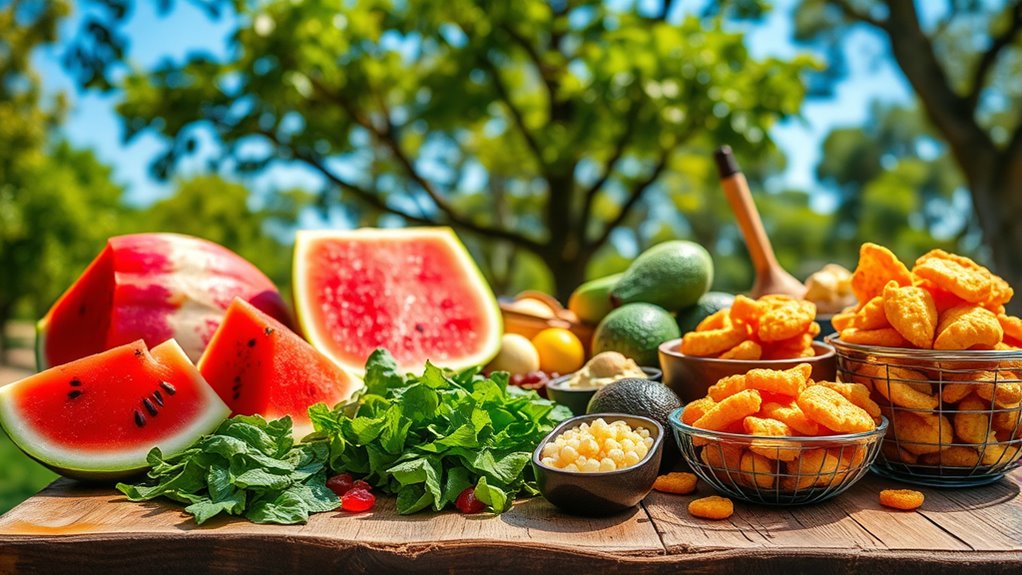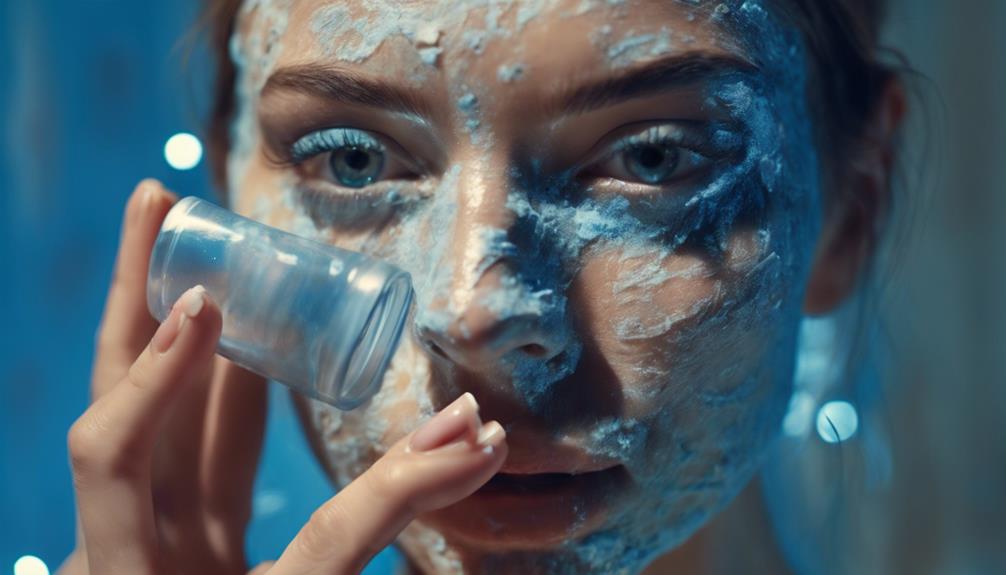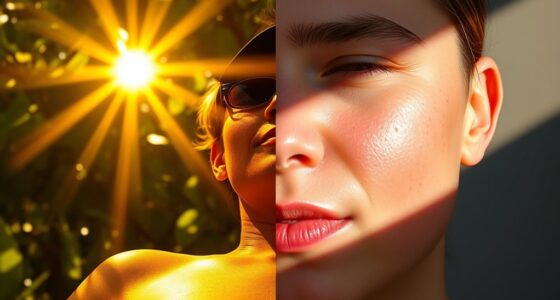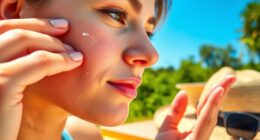To protect your skin in the sun, eat foods rich in antioxidants like berries, citrus, nuts, and leafy greens, which help neutralize free radicals and reduce damage. Include carotenoid-rich foods like carrots, sweet potatoes, and tomatoes, for natural internal sun protection. Stay hydrated with water and water-rich foods, and avoid excess caffeine and alcohol that can dehydrate your skin. Knowing which foods support or harm your skin can boost your sun defense—keep going to learn more.
Key Takeaways
- Consuming antioxidant-rich foods like berries, citrus, and leafy greens helps neutralize UV-induced free radicals and protect skin.
- Carotenoid-rich foods such as carrots, sweet potatoes, and tomatoes boost internal sun defense and enhance skin resilience.
- Hydrating foods like watermelon, cucumber, and oranges support skin moisture and barrier function against sun damage.
- Excessive intake of caffeine and alcohol can dehydrate skin, reducing its ability to withstand UV exposure.
- Poor diet lacking antioxidants and hydration can weaken skin defenses, increasing vulnerability to sun damage and premature aging.

When spending time in the sun, what you eat can substantially impact your skin’s health and how well it protects itself from UV damage. Your diet influences your skin’s resilience, its ability to repair damage, and how effectively it shields you from harmful rays. Two key aspects often overlooked are understanding sunscreen ingredients and maintaining healthy hydration habits, both of which work in tandem with your food choices to bolster your skin’s defenses.
Your diet, hydration, and sunscreen choices work together to protect your skin from UV damage.
Sunscreen ingredients play a essential role in protecting your skin. Chemical filters like avobenzone, octocrylene, and oxybenzone absorb UV radiation, preventing it from penetrating your skin. Physical filters such as zinc oxide and titanium dioxide reflect and scatter UV rays, providing a physical barrier. When you’re choosing sunscreens, look for broad-spectrum options that include these ingredients. But remember, sunscreen is just one piece of the puzzle. The foods you eat can enhance or hinder this protective effect. For example, foods rich in antioxidants like vitamins C and E help neutralize free radicals generated by UV exposure, reducing skin damage. Incorporate berries, citrus fruits, nuts, and leafy greens into your diet, as these contain potent antioxidants that support your skin’s natural defenses.
Hydration habits are equally essential. Staying well-hydrated helps maintain your skin’s moisture barrier, keeping it supple and resilient against UV rays. When your skin is dehydrated, it becomes more prone to sun damage and premature aging. Drinking plenty of water throughout the day ensures your skin remains plump and healthy, creating a more effective barrier against UV radiation. Besides plain water, consuming hydrating foods such as watermelon, cucumber, and oranges can boost your hydration levels naturally. Avoid excessive caffeine and alcohol, as they can dehydrate your skin further, reducing its ability to protect itself.
In addition to hydration and choosing the right sunscreen ingredients, eating foods rich in carotenoids like carrots, sweet potatoes, and tomatoes can amplify your skin’s resistance to sun damage. These compounds act as internal sunscreens, providing an extra layer of defense. Moreover, understanding sun protection strategies can help you make more informed choices to safeguard your skin effectively. Combining these dietary habits with proper sun protection measures maximizes your skin’s ability to withstand UV rays and helps prevent long-term damage like wrinkles, age spots, and skin cancers.
Ultimately, your diet plays a significant role in how your skin handles sun exposure. By paying attention to sunscreen ingredients, staying hydrated, and choosing foods that support your skin’s natural defenses, you can enjoy the sun more safely and keep your skin healthier over time.
Frequently Asked Questions
Can Certain Foods Prevent Sunburns Effectively?
You might wonder if certain foods can prevent sunburns effectively. While no food guarantees complete protection, foods rich in antioxidants can boost your skin’s defenses against UV damage. For example, those with high levels of vitamin C and E help combat free radicals. Additionally, foods influencing skin pigmentation, like beta-carotene-rich carrots, can enhance your natural sun protection. Remember, these foods support, but don’t replace, sunscreen use.
Are There Specific Foods to Avoid Before Sun Exposure?
Sure, avoid foods to avoid before sun exposure like greasy fries or sugary treats—they won’t make you more sun-sensitive. But watch out for sun-sensitive nutrients like alcohol, caffeine, and processed foods, which can dehydrate you or increase skin sensitivity. Cutting back on these helps your skin stay resilient. Remember, if you’re planning a long day in the sun, steer clear of anything that could turn you into a human lobster!
How Quickly Do Diet Changes Impact Skin’s Sun Sensitivity?
Dietary timing influences your skin’s response to the sun within days. When you make changes, such as eating more antioxidants or avoiding certain foods, you might notice effects in about 3 to 7 days. Your skin can become less sensitive or more vulnerable depending on your diet, so it’s essential to maintain consistent habits. Staying mindful of your food choices helps protect your skin’s natural defenses against sun damage.
Do Supplements With Antioxidants Protect Against UV Damage?
Think of antioxidant supplements as a shield for your skin against UV damage. While they can boost your body’s natural defenses, they aren’t a substitute for sunscreen. Antioxidant supplements provide some level of UV protection by neutralizing free radicals caused by sun exposure. However, for the best protection, combine these supplements with other sun safety measures, like seeking shade and wearing protective clothing.
Can Hydration Levels Influence How Foods Affect My Sun Protection?
Hydration effects play a key role in how foods impact your sun protection. When you’re well-hydrated, your skin maintains better moisture levels, which helps your skin stay resilient against UV damage. Proper hydration can enhance the effectiveness of antioxidant-rich foods and reduce dryness that might make your skin more vulnerable. So, drinking enough water supports your skin’s ability to defend itself, working synergistically with your diet to keep your skin healthier in the sun.
Conclusion
Remember, what you eat substantially impacts how your skin reacts to the sun. Including antioxidant-rich foods like berries and leafy greens can protect your skin, while sugary or processed snacks may cause inflammation. Some might think diet’s effects are small, but consistent healthy choices strengthen your skin’s resilience over time. So, don’t overlook your plate—what you eat today can help you enjoy sunny days with healthier, happier skin tomorrow.









